还是div. 3比较适合我这种菜,不过最后一道题一个细节没调出来真的可惜了。
A. Add Odd or Subtract Even
题目链接
题目原文
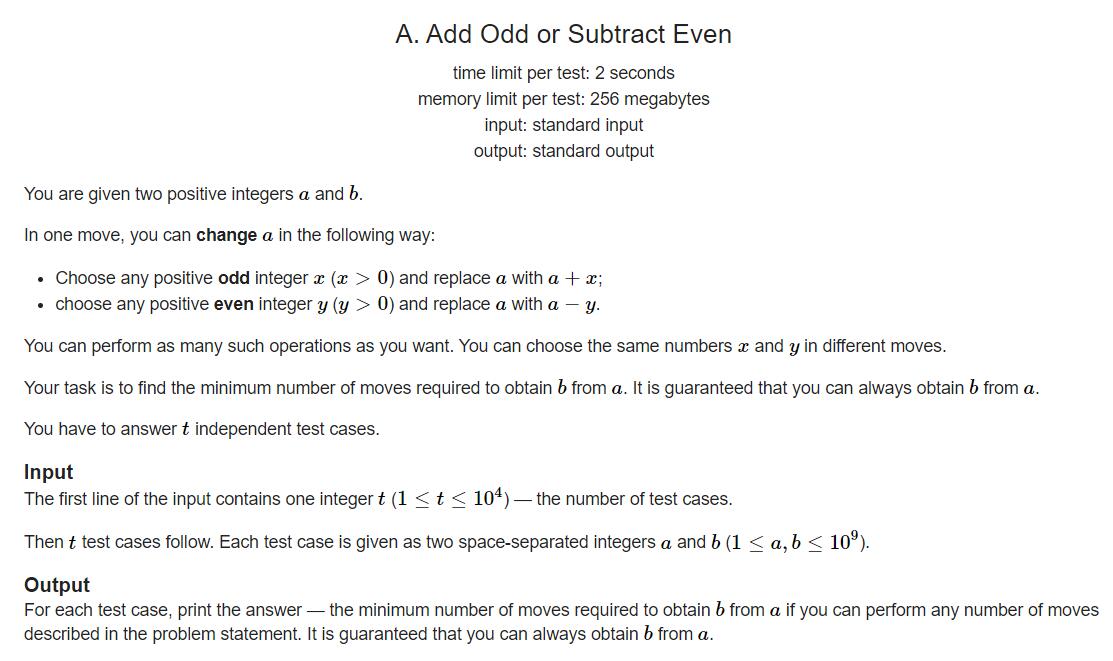
题目大意
给出 a 和 b 两个正整数。每一次操作,你可以将 a 做以下两种操作之一:
- 任选一个正奇数 x ,将 a 加上 x 。
- 任选一个正偶数 y ,将 a 减去 y 。
问至少操作多少次,可以使 a 和 b 的值相等。
思路
容易发现,有以下几种情况:
- a==b ,答案为 0 。
- a<b 。如果 a 和 b 的差值是奇数,那么直接加上一个正奇数就可,答案为 1 ;如果差值是偶数,那么答案为 2 ,加两次正奇数或者加一次正奇数再减一次正偶数。
- a>b 。与2.同理且相反。
代码
1
2
3
4
5
6
7
8
9
10
11
12
13
14
15
16
17
18
19
20
21
22
23
24
25
26
27
28
29
30
31
| #include < cstdio >
#include < cstring >
#include < algorithm >
using namespace std;
const int maxn=200005;
int main()
{
long long T,x,y;
scanf("%lld",&T);
while(T--)
{
scanf("%lld%lld",&x,&y);
long long ans;
if(x==y) ans=0;
else if(x < y)
{
long long temp=y-x;
if(temp&1) ans=1;
else ans=2;
}
else
{
long long temp=x-y;
if(temp&1) ans=2;
else ans=1;
}
printf("%lld\n",ans);
}
return 0;
}
|
B. WeirdSort
题目链接
题目原文
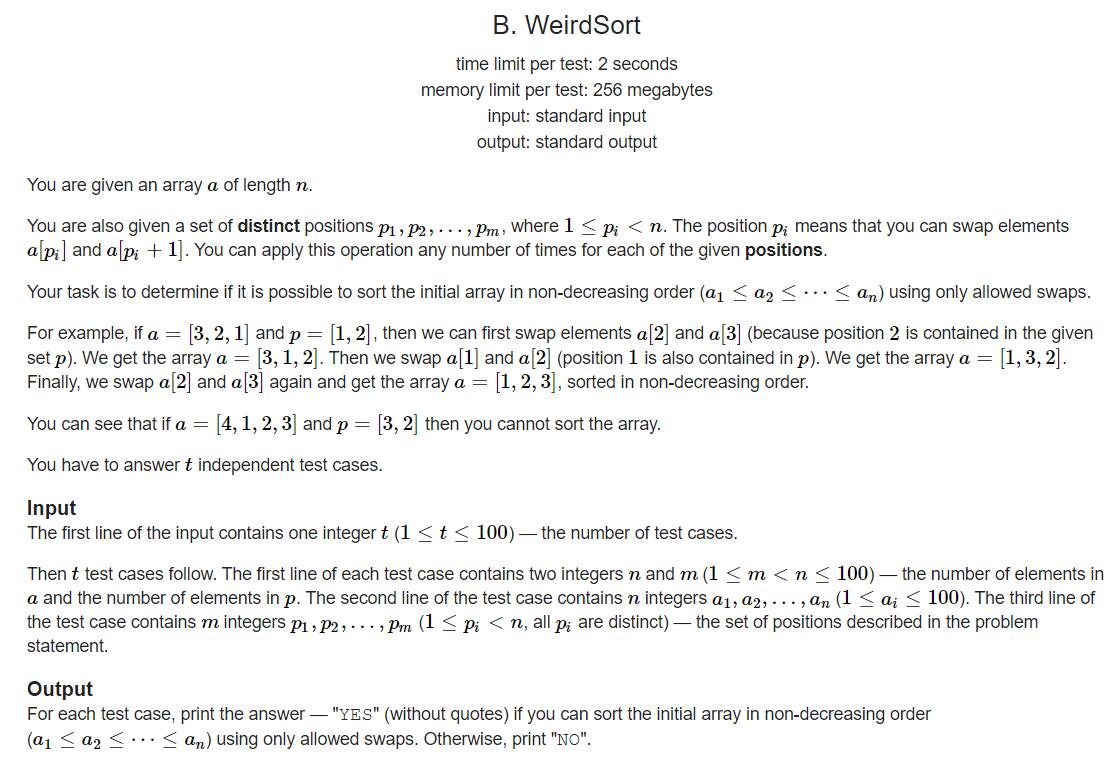
题目大意
给出 n 个数和 m 个位置 posi ,可以让 posi 和 posi+1 交换任意次位置,求是否能通过交换,使这 n 个数以非递减顺序排列。
思路
最开始还没有思路,把C题做了回来一想,因为冒泡排序的思想,所以同一块(可以交换的连通块)中的顺序是任意的,所以直接对每一内部可以互相交换的块内部排序,最后验证序列是否非递减即可。
代码
1
2
3
4
5
6
7
8
9
10
11
12
13
14
15
16
17
18
19
20
21
22
23
24
25
26
27
28
29
30
31
32
33
34
35
36
37
| #include < cstdio >
#include < cstring >
#include < algorithm >
using namespace std;
const int maxn=105;
int T,n,m,p[maxn],a[maxn];
bool vis[maxn];
int main()
{
scanf("%d",&T);
while(T--)
{
memset(vis,false,sizeof(vis));
scanf("%d%d",&n,&m);
for(int i=1;i<=n;i++) scanf("%d",&a[i]);
for(int i=1,x;i<=m;i++)
{
scanf("%d",&x);
vis[x]=true;
}
for(int i=1;i<=n;i++)
{
int s=i,t=i;
while(vis[t]) t++;
sort(a+s,a+t+1);
i=t;
}
bool flag=false;
for(int i=2;i<=n;i++)
{
if(a[i]<a[i-1]) flag=true;
}
if(flag) printf("NO\n");
else printf("YES\n");
}
return 0;
}
|
题目链接
题目原文

题目大意
给出一个字符串,要求枚举一遍该字符串,再给出 m 个错误操作,每次遇到错误操作就会从头开始重新枚举。求最后执行完 m 个错误操作后,26个小写字母每个都被枚举了多少遍。
思路
直接前缀和,每次 O(1) 查询,时间复杂度 O(t⋅max(n,m)⋅26) 。
代码
1
2
3
4
5
6
7
8
9
10
11
12
13
14
15
16
17
18
19
20
21
22
23
24
25
26
27
28
29
30
31
32
33
| #include < cstdio >
#include < cstring >
#include < algorithm >
using namespace std;
const int maxn=200005;
int cnt[maxn][26];
char s[maxn];
int p[maxn],n,m,T;
long long ans[26];
int main()
{
scanf("%d",&T);
while(T--)
{
scanf("%d%d",&n,&m);
scanf("%s",s+1);
for(int i=1;i<=n;i++)
for(int j=0;j<26;j++) cnt[i][j]=0;
for(int i=1;i<=n;i++) cnt[i][s[i]-'a']++;
for(int i=1;i<=n;i++)
for(int j=0;j<26;j++) cnt[i][j]+=cnt[i-1][j];
memset(ans,0,sizeof(ans));
for(int i=1,x;i<=m;i++)
{
scanf("%d",&x);
for(int j=0;j<26;j++) ans[j]+=cnt[x][j];
}
for(int i=0;i<26;i++) ans[i]+=cnt[n][i];
for(int i=0;i<26;i++) printf("%lld ",ans[i]);
printf("\n");
}
return 0;
}
|
D. Three Integers
题目链接
题目原文
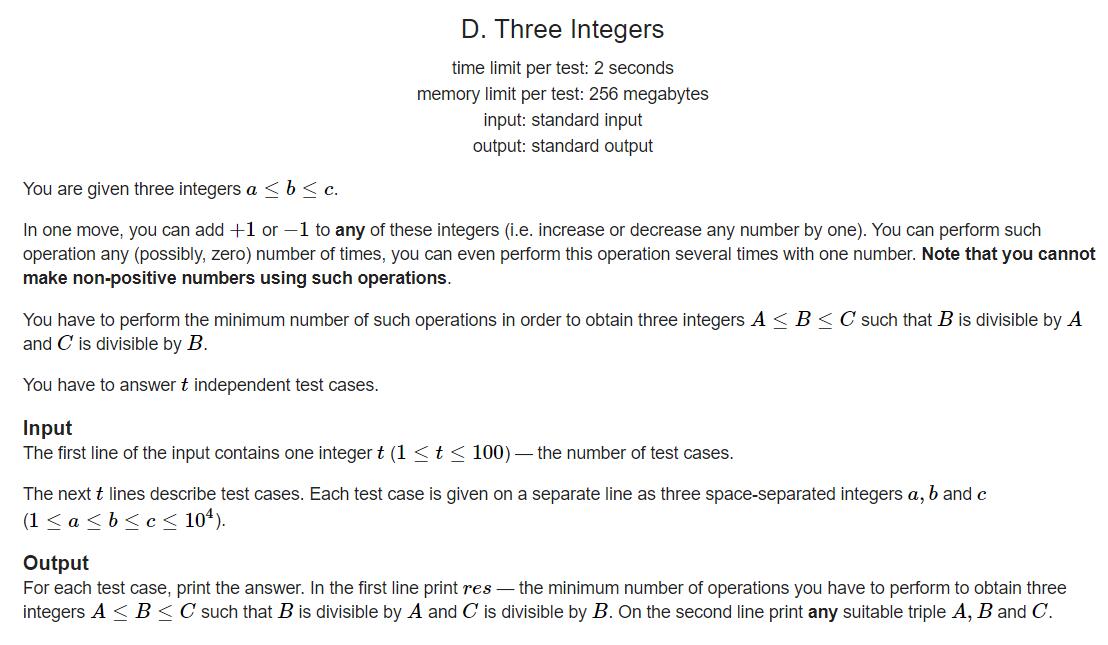
题目大意
给出 A , B , C 三个正整数,每次可以将这三个数任意一个数加上 1 或者减去 1 ,求最少操作多少次,能使 C 能被 B 整除, B 能被 A 整除。
思路
因为数据范围是 10000 ,直接枚举 A ,再枚举 B ,C 就不要枚举了,直接除以枚举的 B ,直接取最近的值就好。
代码
1
2
3
4
5
6
7
8
9
10
11
12
13
14
15
16
17
18
19
20
21
22
23
24
25
26
27
28
29
30
31
32
33
34
35
36
37
38
39
40
41
42
43
44
45
46
47
48
49
50
51
52
53
54
55
56
| #include < cstdio >
#include < cstring >
#include < algorithm >
using namespace std;
const int maxn=200005;
int main()
{
#ifdef lemon
freopen("D.txt","r",stdin);
#endif
long long T,a,b,c;
scanf("%lld",&T);
while(T--)
{
scanf("%lld%lld%lld",&a,&b,&c);
long long ans=1e18,ansa,ansb,ansc;
for(long long i=1;i<=10000;i++)
{
for(long long j=1;j<=10000;j++)
{
if(i*j>50000) break;
long long temp=0,tempa,tempb,tempc;
temp+=abs(a-i)+abs(b-i*j);
long long p=c/(i*j);
tempa=i;tempb=i*j;
if(p==0)
{
temp+=abs(c-i*j);
tempc=i*j;
}
else
{
if(abs(c-i*j*p)<abs(c-i*j*(p+1)))
{
temp+=abs(c-i*j*p);
tempc=i*j*p;
}
else
{
temp+=abs(c-i*j*(p+1));
tempc=i*j*(p+1);
}
}
if(temp < ans)
{
ans=temp;
ansa=tempa;
ansb=tempb;
ansc=tempc;
}
}
}
printf("%lld\n%lld %lld %lld\n",ans,ansa,ansb,ansc);
}
return 0;
}
|
E. Construct the Binary Tree
题目链接
题目原文
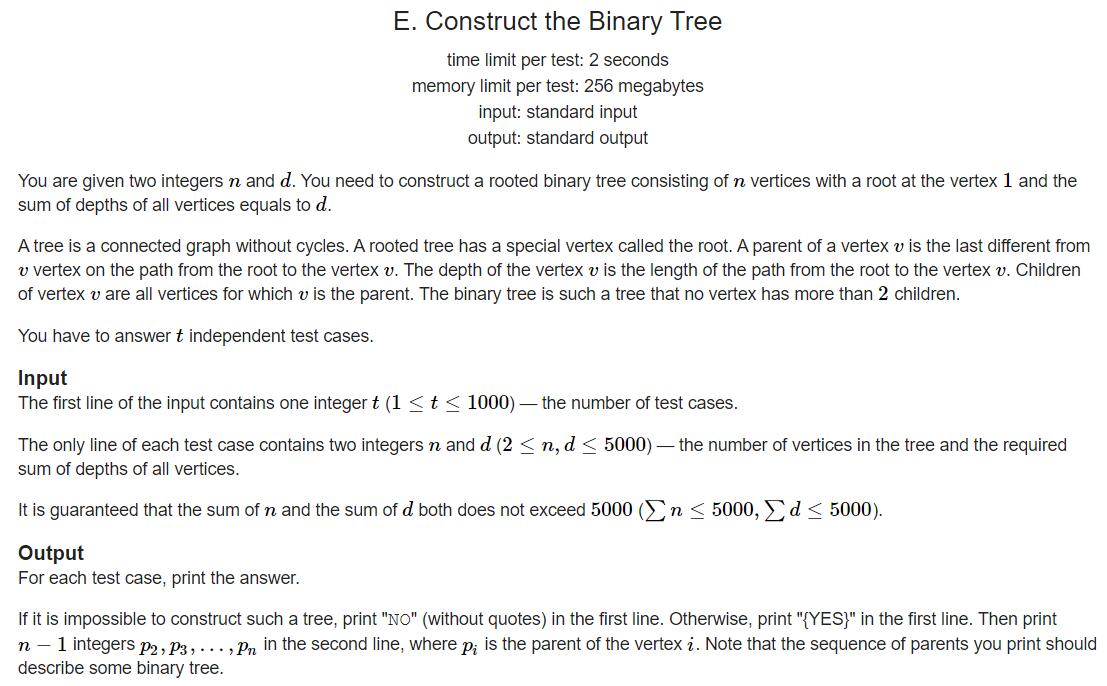
题目大意
给出 n 和 d ,求问存不存在 n 个点的二叉树,其所有节点的深度之和为 d ,如果存在,需要输出每一个节点的父节点(根节点为 0 )。
思路
先把 n 个点连成一条链,再不断地从链尾取下点按深度递增的顺序加在某些点后即可。
代码
1
2
3
4
5
6
7
8
9
10
11
12
13
14
15
16
17
18
19
20
21
22
23
24
25
26
27
28
29
30
31
32
33
34
35
36
37
38
39
40
41
42
43
44
45
46
| #include < cstdio >
#include < cstring >
#include < algorithm >
using namespace std;
const int maxn=5005;
int T,n,d;
int point[maxn][maxn],fa[maxn],cnt[maxn];
int main()
{
scanf("%d",&T);
while(T--)
{
scanf("%d%d",&n,&d);
for(int i=0;i < n;i++)
{
fa[i+1]=i;
cnt[i]=1;
point[i][0]=i+1;
}
int res=n*(n-1)/2-d;
if(res<0)
{
printf("NO\n");
continue;
}
int depth=1;
for(int i=n-1;i;i--)
{
int delta=min(i-depth,res);
res-=delta;
int pos=i-delta;
fa[i+1]=point[pos-1][cnt[pos]/2];
point[pos][cnt[pos]++]=i+1;
if(cnt[pos]>=(1 < < depth)) depth++;
if(!res) break;
}
if(res!=0)
{
printf("NO\n");
continue;
}
printf("YES\n");
for(int i=2;i<=n;i++) printf("%d ",fa[i]);
}
return 0;
}
|
F. Moving Points
题目链接
题目原文
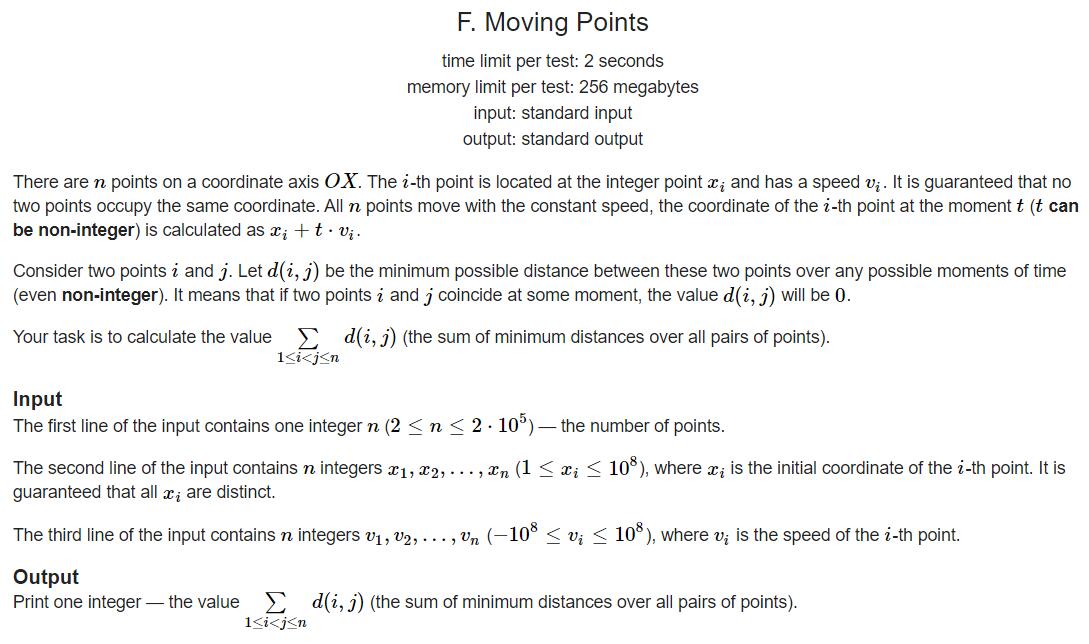
题目大意
在 X 轴上有 n 个点,每个点有一个初始坐标 xi 和一个速度 vi ,求问每每两个点对之间可能达到的最近距离之和,时间可以为正为负为零且不一定为整数。
思路
感觉这道题的变形都有好多了,看完题就知道肯定是和时间没有关系的。
所以对于任意两个点 i , j ,假使 xi<xj 分两种情况讨论:
- vi≤vj ,那么最近的时候就是初始位置时,对答案贡献为 xj−xi 。
- vi>vj ,那么一定会相遇,对答案贡献为 0 。
所以我们先对初始位置从小到大排序,再对速度离散化,用树状数组或者线段树维护一个前缀和,就好了。我没调出来的原因是计数的时候乘错地方了(后悔死)。
代码
1
2
3
4
5
6
7
8
9
10
11
12
13
14
15
16
17
18
19
20
21
22
23
24
25
26
27
28
29
30
31
32
33
34
35
36
37
38
39
40
41
42
43
44
45
46
47
48
49
50
51
52
53
54
55
| #include < cstdio >
#include < cstring >
#include < algorithm >
#define lowbit(x) (x&(-x))
using namespace std;
const int maxn=200005;
struct node
{
int x,v;
} a[maxn];
bool cmp(node a,node b) {return a.x<b.x;}
int cnt[maxn],n,b[maxn];
long long val[maxn];
void add(int x,int v)
{
for(int i=x;i<=n;i+=lowbit(i))
{
cnt[i]++;
val[i]+=(long long)v;
}
}
long long get(int x)
{
long long temp=0;
for(int i=x;i;i-=lowbit(i)) temp+=val[i];
return temp;
}
long long getc(int x)
{
long long temp=0;
for(int i=x;i;i-=lowbit(i)) temp+=cnt[i];
return temp;
}
int main()
{
scanf("%d",&n);
for(int i=1;i<=n;i++) scanf("%d",&a[i].x);
for(int i=1;i<=n;i++)
{
scanf("%d",&a[i].v);
b[i]=a[i].v;
}
sort(b+1,b+n+1);
int cnt=unique(b+1,b+n+1)-(b+1);
for(int i=1;i<=n;i++) a[i].v=lower_bound(b+1,b+cnt+1,a[i].v)-b;
sort(a+1,a+n+1,cmp);
long long ans=0;
for(int i=1;i<=n;i++)
{
ans+=a[i].x*getc(a[i].v)-get(a[i].v);
add(a[i].v,a[i].x);
}
printf("%lld\n",ans);
return 0;
}
|















